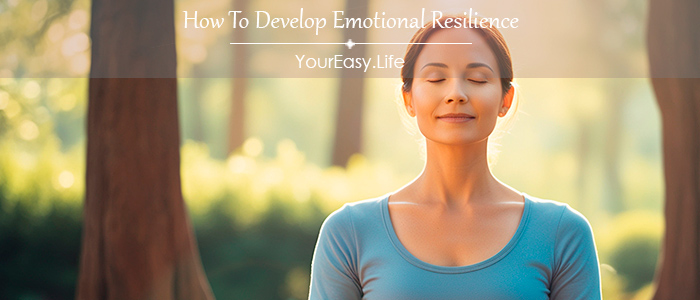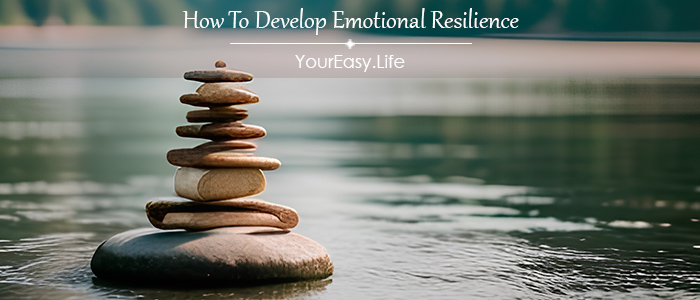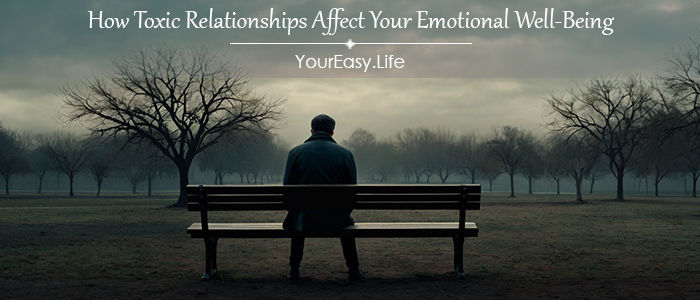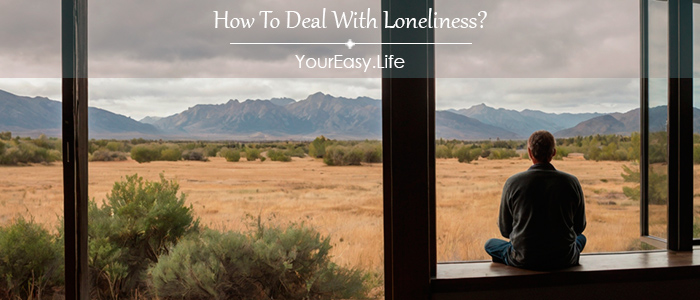Emotional resilience is a skill that helps you cope with difficulties, maintain inner balance, and recover quickly from stressful situations. If you’ve ever felt emotionally drained, especially after facing challenges or stress, then you understand how important it is to have inner resources to handle these obstacles. In this article, we’ll explore proven techniques and methods that can help you develop emotional resilience and boost your confidence.
What Is Emotional Resilience?
Emotional resilience is the ability to adapt to life’s challenges, handle stress, and manage emotional overload. People with strong emotional resilience can better endure hardships, recover faster from setbacks, and maintain a positive outlook on life. This doesn’t mean you’ll never feel stressed or anxious, but you will learn to manage these emotions effectively and bounce back from them more quickly.
How To Develop Emotional Resilience?
There are many techniques to help you develop emotional resilience, and each one can be useful depending on your circumstances. Here are a few proven methods:
Mindfulness Meditation
Have you ever noticed how often you worry about things that aren’t happening right now? Mindfulness meditation is a practice that helps you focus on the present moment without dwelling on the past or future. It teaches you to observe your thoughts and emotions without judgment, reducing anxiety and helping you better cope with challenges.
Practice mindfulness meditation to develop this quality. Start with just a few minutes a day by focusing on your breathing. When anxious thoughts start to take over, return to observing your breath — this will help ground you, calm you down, and develop your emotional resilience.
“I don’t have time for meditation or other techniques.” Mindfulness doesn’t require much time. You can start with just 5 minutes a day, and over time, you’ll notice how it improves your ability to handle challenges.
Cognitive Behavioral Therapy (CBT)
Our thoughts can either increase or decrease stress. Cognitive Behavioral Therapy (CBT) is a method that helps you shift negative thought patterns into positive ones, which can significantly improve your emotional resilience. For example, if you often think, “I’ll never manage this,” CBT will help you reframe that thought into, “I can handle this one step at a time.” This gives you more confidence and helps you realize that stress is something you can manage.
Physical Activity
When we move, our body releases endorphins — the “happiness hormones” that improve mood and help us cope with stress. Even a simple walk in the fresh air can significantly improve your well-being. Try incorporating regular physical activity into your life — it will help reduce stress levels and contribute to your emotional resilience.
Affirmations
Sometimes, your inner dialogue can be your biggest enemy. Affirmations are positive statements that help replace negative thoughts with positive ones. For example, if you often feel insecure, repeat to yourself: “I can handle this,” “I am strong,” “I am capable.” Gradually, your mind will start to accept these affirmations, and you’ll feel your confidence grow.
“Meditation and affirmations seem strange and unnatural.” This is a common concern. Yes, these techniques may feel unusual at first, but regular practice will help you experience their benefits. Start with small steps and choose the methods that feel most comfortable for you.

Gratitude Journaling
Writing down at least three things you’re grateful for every day trains your mind to notice the positives. This helps shift your focus from negative moments to positive ones, reducing stress. Start with simple things: be grateful for a sunny day, a friend’s support, or a good cup of coffee. This method strengthens your emotional resilience by helping you see the good even in difficult times.
Support From Others
Don’t hesitate to seek support from friends or family. Talking to loved ones can help you cope with challenges and find new solutions to problems. You’re not alone — your loved ones can be a valuable resource in building your emotional resilience.
“What if I can’t share my problems with others?” Receiving support from others can be an important step in developing emotional resilience. If sharing is difficult, try starting with a professional counselor or support group, where you can open up without fear of judgment.
Developing Emotional Intelligence
Emotional intelligence is the ability to understand and manage your emotions while interacting effectively with others. It helps you handle conflicts, stressful situations, and maintain confidence in any circumstance. Developing this skill strengthens your emotional resilience and makes you more open to challenges.
Breathing Techniques
Breathing techniques are simple yet effective ways to manage stress and develop emotional resilience. When stressed, our breathing becomes shallow, increasing anxiety. Conscious deep breathing helps slow your heart rate, calm your mind, and regain control over the situation. Try the 4-7-8 technique: inhale for 4 seconds, hold your breath for 7 seconds, and exhale slowly for 8 seconds.
Setting Realistic Goals
When faced with a big task, it can seem overwhelming. Setting realistic goals helps break it down into smaller steps, each bringing you closer to the result. Small achievements boost confidence, reduce stress, and gradually strengthen your emotional resilience.
“My goals seem unattainable, and it causes more stress.” Try breaking large goals into smaller, more manageable tasks. Each step completed will boost your confidence and lower stress levels. Gradually, you’ll be able to reach even the most ambitious goals.
Self-Compassion
Sometimes, we’re too hard on ourselves, especially when facing difficulties. Self-compassion is the ability to show yourself understanding and kindness in tough moments. It helps prevent self-blame and maintain emotional balance. Remember that mistakes are a part of life, and they make us stronger.
“I often feel guilty about my emotions and can’t handle them.” Practicing self-compassion helps manage feelings of guilt. Acknowledge your emotions and accept them without judgment. Over time, this will help you better understand your feelings and reduce inner conflicts.
Conclusion
Developing emotional resilience is a process that takes time and practice, but each of these methods can be an important step along the way. Mindfulness, support from loved ones, physical activity, and affirmations will help you handle challenges, and consistently practicing these skills will make you stronger and more confident. Start with small steps, and you’ll see how your life gradually becomes more balanced and harmonious.
Frequently Asked Questions
Scientific Research, Data And Articles
- The Efficacy of Cognitive Behavioral Therapy: A Review of Meta-analyses. Stefan G. Hofmann, Ph.D., Anu Asnaani, M.A., Imke J.J. Vonk, M.A., Alice T. Sawyer, M.A., and Angela Fang, M.A.
- Exercise and stress: Get moving to manage stress. By Mayo Clinic Staff
- Self-affirmation promotes health behavior change. Epton, T., & Harris, P. R. (2008). Health Psychol. 2008 Nov;27(6):746-52. doi: 10.1037/0278-6133.27.6.746.
- Symptoms and characteristics of burnout. Mauranges A.





